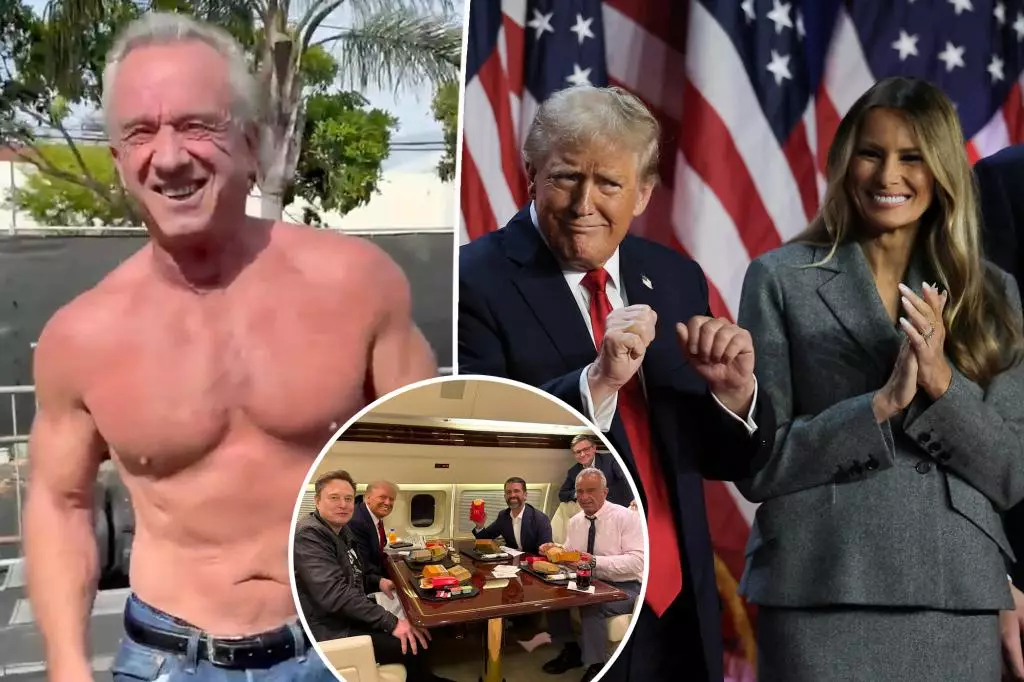In the midst of political drama and personal transformations, dietary choices often emerge as interesting talking points. Recent reports from Page Six highlight an unexpected collaboration aimed at redefining Donald Trump’s eating habits. The dietary initiative reportedly involves RFK Jr. and Melania Trump attempting to persuade the former President to adopt a healthier lifestyle. As the discussions unfold, critical questions arise surrounding the authenticity of this campaign, its implications, and its broader cultural context.
According to informants, RFK Jr. and Melania are united in their quest to encourage Trump to deviate from his fast-food inclinations, favoring a diet rich in lean proteins, fresh vegetables, and nutritious salads. This dietary intervention stands in stark contrast to Trump’s well-documented taste for indulgent fast food, including his infamous Big Macs and KFC. While the proposed dietary shift may seem benign on the surface, it signals a unique intersection of personal health and political maneuvering that demands further examination.
The timing of this initiative coincides with RFK Jr.’s endorsement of Trump for the upcoming election, as he relinquishes his own presidential ambitions. As the new appointee for the Department of Health and Human Services, Kennedy’s position raises eyebrows, especially in light of his prior condemnation of fast food as “poison.” Such contradictions manifest in Kennedy’s recent appearances aboard “Trump Force One,” where he was photographed with fast food, further complicating the narrative surrounding his health crusade.
The intricate web of alliances and contradictions within Trump’s circle invites skepticism. While the insiders claim that Melania supports the healthy eating initiative, Trump’s notorious culinary preferences pose significant challenges. Indeed, another source dismisses the idea, insisting that “Trump eats whatever he wants.” This presents a dichotomy between the aspirations of health advocates and Trump’s established lifestyle. Moreover, the notion that Kennedy’s McDonald’s pose was a calculated move to “own the libs” indicates a playful yet politically charged intention, reflecting the often Farcical nature of political interactions.
There is an intriguing irony in the juxtaposition of Kennedy’s advocacy for healthier school lunches and simultaneously being part of a photo op that symbolically endorses fast food. This duality plays into the broader narrative of image versus reality, especially within extreme political contexts. It raises the question of whether dietary choices are becoming a form of political commentary rather than genuine lifestyle changes.
Melania Trump’s involvement adds another layer to this narrative. Reports indicate she has begun cooking family dinners and promoting healthier eating habits within the Trump household. Known for her meticulous attention to personal health, Melania’s potential influence on her husband’s diet offers a glimmer of hope for dedicated followers of healthy living. If Melania can indeed sway the President-elect towards embracing more nutritious food choices, the impact could ripple through the conservative factions that closely identify with Trump’s ideologies.
Yet skepticism remains, particularly concerning the sincerity of this dietary pivot. While the media often scrutinizes Melania for her seemingly aloof demeanor, her commitment to wellness could signify a desire to project a healthier image of the Trump family amid a culture that increasingly values well-being. But at what cost? The notion of a public figure transforming their dietary practices under political pressures remains a complex and often contradictory affair.
Ultimately, the entertainment aspect of this dietary saga raises broader questions regarding societal values surrounding health and politics. The interplay between public figures and their dietary choices often transcends personal health; it becomes a microcosm of cultural attitudes towards nutrition and political correctness. As public discourse gravitates toward wellness as a virtue, the ongoing evolution of dietary preferences among political elites is worth observing—not only for its potential public health benefits but also for its implications in shaping national narratives.
While Melania Trump and RFK Jr. strive to coax Donald Trump towards healthier eating habits, the reality of this initiative beckons nuanced reflection. The intermingling of dietary advocacy and political allegiance creates a rich tapestry of contradictions, showcasing that, in political circles, the personal truly may become public, and every bite is inevitably scrutinized under the lens of societal expectations.
